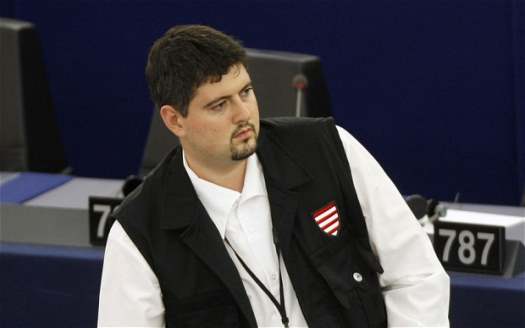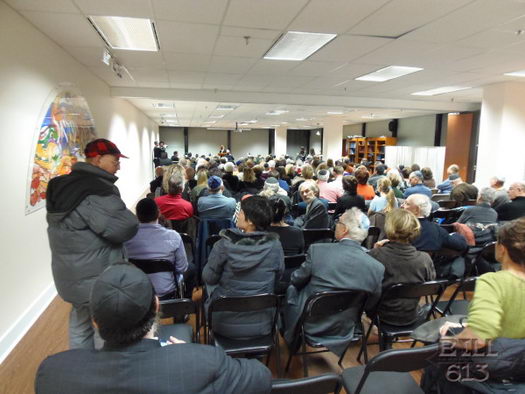
Canada Deports Ex-Nationalist Before Talk at Chabad
Forgiveness was never going to be an easy sell for Csanad Szegedi in Montreal’s Jewish community.
Monday night it didn’t happen at all.
Szegedi, one of the leaders of Hungary’s far-right, overtly anti-Semitic, Jobbik party until he discovered his Jewish ancestry, was booked to tell his story of “return, reparations and repentance” at the Chabad of Westmount.
Instead, organizers say immigration officials who looked at his papers when he arrived Sunday night ordered him out of the country on the first plane back to Budapest. The roughly 200 people who turned out to hear what he had to say and ask questions had to make do with a videotape.
Devorah Shanowitz, who invited Szegedi to speak, said the exact reasons he wasn’t allowed to stay long enough to deliver his lecture were murky. But she said there was no denying the fact that many people in the community were upset.
“From what I understand, there were some members of the community who felt very strongly that Mr. Szegedi should not be here to tell his story. They sent a file of his past activities to Immigration Canada, and there was no evidence in those files that he had since moved away from his previous lifestyle.
“First they said they just wanted to question him and then they said no, they actually would not allow him to stay here. … Even though our talk was at 7, he had to leave an hour before everyone came here.”
An official from Citizenship and Immigration Canada said a case worker would examine the file and try to find out why Szegedi had been deported, a decision that would have been made by Customs and Border Services. However, she said release of any details would be contingent on Szegedi’s willingness to sign a privacy waiver.
Shanowitz said Szegedi was disappointed because “he is on a different path (now) and this kind of sets him back.”
Shanowitz, whose grandmother survived the Holocaust and whose grandfather did not, said no one was asking people to forgive what Szegedi had said or done in the past.
She said she heard from many people who didn’t want to give Szegedi a forum to speak.
“My answer to them was we are not offering him absolution. We are not kosherizing him. We are not putting a label saying he is now good. We are saying, what a compelling story,” she said.
“I believe the best way to fight anti-semitism is to find out why it happens, how it happens.”
Update: Zvi Hershcovich was present at the event, and wrote the following on the Montreal’s Jewish Community Blog – Bill 613:
Rabbi Yossi and Devorah Shanowitz of Chabad of Westmount were trying to bring about dialogue about Teshuvah and they definitely succeeded when they decided to bring down Csanad Szegedi, the 30-year-old former leader of the openly anti-Semitic Jobbik party in Hungary who, upon discovering he was a Jew, started a controversial return to Judaism.
As leader of Jobbik, Szegedi had incited violence, hatred, and called for expulsion of the Jews from Hungary, and several Hungarian Jews feel that his sudden “return to Judaism” is a ploy and will eventually be used against us. Before Szegedi’s arrival, there was controversy and calls for Chabad to rescind their invitation, in what would mark the first time Szegedi would be speaking to an audience outside of Hungary.
Ultimately, 200 people showed up to Chabad of Westmount for an evening centered around discussion on whether a person from a path so far from Judaism can indeed do complete Teshuvah and be accepted into the community.
The event opened with Rebbeztin Devorah Shanowitz stressing that even though she is the granddaughter of Holocaust survivors and her husband the son of survivors, they felt it important to bring Szegedi to Montreal to foster dialogue about Teshuvah.
“Teshuvah is not forgiveness,” said Shanowitz. “It’s repentance.”
Rebbetzin Shanowitz went on to explain that we cannot forgive and absolve Szegedi of his previous actions, but it’s in his hands to do Teshuvah. She then described Teshuvah in four steps. First, one must acknowledge what they have done. Then, they must express remorse. Step three is to make a commitment to never do it again, and the last step of Teshuvah is when given the opportunity to do it again, they don’t.
“This evening isn’t about absolution,” said Shanowitz. “It’s about repair, and only one step of repair.”
She explained that he was brought down to acknowledge his actions and face people he had hurt. He was going to take questions from the audience, but unfortunately he had to leave before the lecture and instead gave a speech on video which would soon be displayed.
Rebbetzin Shanowitz then explained that Mr. Szegedi was told by Immigration Canada that he was not welcome to stay because of his past activities based on information that they received, and he had been given an entry visa that expired one hour before the event when the first plane out of Montreal would depart back to Budapest. The Shanowitzes spent the day on the phone with Ottawa, trying to work things out and constantly being told that if they wait a little longer his visa would be extended, but ultimately Szegedi had to return to the airport and leave Canada.
Instead, Rabbi Baruch Oberlander, the Chief Rabbi and Av Beis Din of Budapest, who had been in North America to celebrate the engagement of one of his children, had been brought down to speak to the crowd.
Rabbi Oberlander told the crowd that when he first met with Szegedi, he thought of a story that happened to the Lubavitcher Rebbe Zatza”l. A man once told the Rebbe that he felt like a hypocrite going to Shul on Yom Kippur when he didn’t go the rest of the year. The Rebbe responded by saying that the natural place for a Jew to be is in Shul. “You’re not a hypocrite when you go to Shul on Yom Kippur,” said the Rebbe. “You’re a hypocrite when you don’t go to Shul the rest of the year!”
A week before Szegedi called Rabbi Shlomo Koves, news had already been going around that he might be a Jew. Rabbi Oberlander decided to give a Shiur in his Shul on the topic of “if he is a Jew, can we accept Csanad Szegedi in a Minyan?”
“Be careful what you wish for,” joked Oberlander. On friday afternoon, after many hours of research, Rabbi Oberland found the answer in Shulchan Aruch, where it discusses an apostate who approaches a Rabbi and says “I’d like to return to Judaism.” According to Halacha, from the moment the Meshumad says those words, even if he hasn’t acted upon them and even if they were said offhand, the apostate is 100% Jewish to the point where he may even be a kosher witness!
“That Tuesday, I had just finished updating my lecture and putting it together in an 11 page booklet, when Rabbi Koves called me up and told me that Szegedi was on the phone with him and wanted to meet with us,” said Oberlander. “Had he called one week earlier, I wouldn’t know what to do.”
Oberlander and Koves met Szegedi with several preconditions. No media and no photographs. Prior to the meeting, the two Rabbis met and discussed every possible scenario – except for what actually happened. “He walked in and said I’d like to return to Judaism and I want to ask your forgiveness,” said Oberlander. “We told him that Rabbis don’t has the power to forgive. Forgiveness in Judaism is a process, and he must ask everyone he harmed for forgiveness.”


































BCH
If this guy really feels bad about his past, why doesn’t he just crawl into a dark corner somewhere and not make all this noise and the speeches?
Ezra
Because teshuvah – and avodas Hashem in general – isn’t just about feeling sorry for yourself, but about “lesakein olam bemalchus Sh-a-dai.”
BCH
Ezra, great! Let him go make speeches to his anti-Semitic former friends and associates and convince them to stop hating Jews! I can totally understand why Jews would not want to be lectured by the likes of him.
Also, he has the temerity to declare that “he is on a different path (now) and this kind of sets him back.” What chutzpah!
Ezra
OK, then, BCH, what’s good for the goose is good for the gander. Kindly reply to this by posting:
* your full name
* every aveirah you’ve ever done
…and then the rest of us can decide whether we want to be “lectured by the likes of you.”
…What, that only applies to the “other,” not to shpitz Chabad like yourself? Well, who woulda thunk it…
Lifelights
The evening was AMAZING! What portended to be and evening of confrontation and confutation was masterfully turned into an evening of Shalom and co-operatiion by Rebbetzin Schanowitz and Rabbi Oberlander. The approximately 200 people who DID stay – as did and my friends – to see an excellent video, brilliiantly prepared by Chabad of Westmount, which allowed Mr. Szegedi the opportunity to express his story in a peaceful, civilized way – which would not have been the case had he been “thrown to the lions”
went away with a sense of great awe and satisfaction at having been able to witness an incredible journey which Mr. Szegedi has undertaken. The “Lions” are still ‘roaring’ – at least some of those who stayed to view the video. Having spoken to a couple of the Hungarian “lions” after the video, their opinions seem to have softened somewhat, unlilke those moisserim who were only the “axe” in Hashem’s hand that prevented a ‘massacre’. Kol HaKavod to Chabad or Westmount!
israel
he should move to Israel and move on with his life and teshuva….
Lifelights
He is trying to move on with his life and his teshuva, but as he so clearly and articulately explains in the video (and as any Baal Teshuva will tell you) it is a process that takes time. Yes, (the decision to do) teshuva can be done in an instant, but the numerous changes in lifestyle, and the learning required in order to make those changes take time. This evening was a tremendous Kiddush Hashem for Chabad of Westmount, and a tremendous Kiddush Hashem for Lubavitch and the Rebbe’s schluchim: The Shanowitz’s and Rabbi Oberlander of Hungary.
What happened to "US"
This is one of ours. A yid, a tinok shnishbah. It’s so necessary to pull the strength from deep pain and find a way to unite. We must look within and know who we are. We are all one from the same source and we must put everything into strengthening this achdus in order to overcome all these challenges right before moshiach. It’s the only way to do away with evil forever!
David Mandler
I’ve just written about this issue for the third time. Here’s my article for those of you who are interested in the topic from another angle.
http://drmandler.wordpress.com/2013/12/17/csanad-szegedi-revisited-the-hatred-continues/
Feel free to share this link on your Facebook wall.